April 2025 meeting
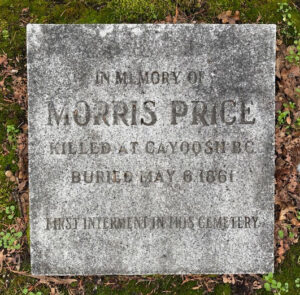
Murder in Cayoosh - part 2
The full story of Morris Price and his brothers, the St Loskys
By David Scriven
In our February meeting I told the story of Jacob St Losky who stated that he was Morris Price’s brother and was appointed administrator of Morris’s estate. I also discussed Samuel St Losky, a presumed relative of Jacob, but said and knew very little about the life of Morris Price and was unable to confirm that Jacob and Morris were brothers. The day after my talk a member of our group contacted me with information about Morris that enabled me to track him from his arrival in the United States until his death in Cayoosh. It also allowed me to connect Morris to the St Losky brothers and learn something about their life in America before they adopted their pseudonym.
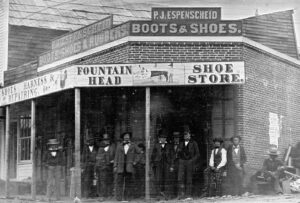
Morris Price was a pedlar, merchant and frontiersman. He lived in at least four Western gold rush towns and met his untimely end in the last one, Cayoosh. The talk will begin with a recap of what was presented in February before describing our new findings.
David Scriven is a scientist recently retired from UBC and long-time member of the JGSBC.
February 2025 meeting
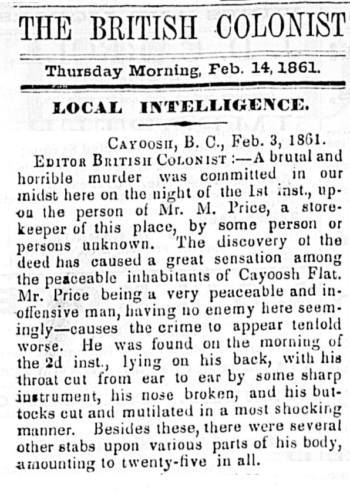
Murder in Cayoosh
Finding the brother of the first Jew buried in Victoria
By David Scriven
During the night of February 1st 1861, a Jewish storekeeper named Morris Price was brutally murdered in Cayoosh (now Lillooet) in the Colony of British Columbia. The shocked citizens raised a large reward and within a short time the perpetrators were apprehended. The local Masons buried the unfortunate man but three months later his body was disinterred and transported to Vancouver Island where he was buried with pomp by the Masons and Jews of Victoria becoming the first Jew buried in that cemetery. In Oct 1861 one Jacob St Losky of Vancouver Island, the brother and next of kin of Morris, was appointed Administrator of his estate.
The question was put to us by a law professor in Toronto who studied this case: “Who were Morris Price and Jacob St. Losky?”
We will try and unravel this mystery as we follow a pathway that leads from Prussia to England and America through the Panama Isthmus to the towns of the California Gold Rush and lastly to the Fraser Valley Gold Rush. Along the way we will encounter burglary, attempted murder, fire, Cuban cigars, smuggling and the Pony Express. We will briefly hear about President-elect Abraham Lincoln and consider the difficulty of communicating from the isolated colonies of British Columbia and Vancouver Island to the eastern parts of the North American continent before the building of a telegraph or railroad that crossed either country.
David Scriven is a scientist recently retired from UBC and long-time member of the JGSBC.
May 2023 meeting
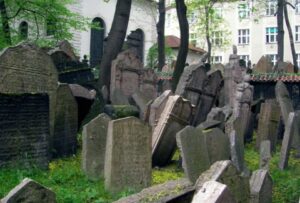 The Old Jewish Cemetery in Prague & Genealogy
The Old Jewish Cemetery in Prague & Genealogyby Joshua Grayson
More than a famous tourist landmark the Prague Old Jewish Cemetery is one of the most important sources of information on the Jewish community of Early Modern Prague. As a seminal community—particularly, as one of the only ones with both documentation and surnames dating to the fifteenth century—this population plays a pivotal role in our understanding of Ashkenazi genealogy. While the cemetery was documented in the late nineteenth century, only a small part of this work was published.
In coordination with former Los Angeles Holocaust Museum president E. Randol Schoenberg, Dr. Joshua Grayson is working to create a complete database of names from the cemetery using the most important manuscript sources. This multimedia presentation will cover background information on the cemetery and its history, outline some of the many challenges and solutions, and offer a tantalizing look at some of the insights that this project can provide.
Since childhood, genealogy has connected Dr. Grayson with his beloved grandparents -- although back then, he had no way of knowing that it would become an obsession that would change the course of his life. During the course of his doctoral studies at the University of Southern California, he acquired a wide assortment of research skills -- gathering historical evidence, critically evaluating sources, developing knowledge, and effectively communicating ideas and research findings. Since then, he has conducted genealogical research in German, Russian, Polish, Hebrew, Yiddish, French, and Spanish, and is proficient in many historical scripts including Kurrentschrift, pre-1917 Russian cursive, 19th-century Hebrew/Yiddish cursive, and Rashi typeface. Since then, he has put those skills to use for his personal genealogy research and for his services as a professional genealogist.
Next Meeting: Wed 1 March 2023 @ 7:30pm
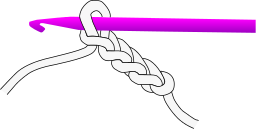
Canadian Jewish Genealogical Resources
by Judith Comfort
While we love the behemoth genealogy databases ...JewishGen, Ancestry, FamilySearch, FindMyPast & My Heritage, this workshop will focus on the Canadian microcosm, for one basic reason - in spite of the tough journeys our families took over the centuries, we are the lucky ones, who ended up in Canada.
Honest research necessitates that we start with what we know, and build on that - one step at a time, creating an historical thread backwards in time, comparing bubbe-meises with hard evidence to come up with the truth. What family issues, historical events, or social injustices caused your ancestors to leave their homes and start a chain of actions that conspired to bring us, their descendants, to this place and time? Fortunately, Canadian memory institutions collected traces of our Baba's and Zaida's lives when they crossed a border to go to a TB clinic in California; when they fomented a tax scandal in the fur business, or gossiped to a Yiddish newspaper columnist.
This workshop will hopefully not only lead you to some new resources, but also to understanding of your family in a wider context of the time and place.
Judith Comfort is a retired high school teacher-librarian and writer, who like many of us, came to genealogy after the loss of her parents and their generation. Her mother and father's people immigrated from Ukraine and Bessarabia to Winnipeg about 1900 with a whole bunch of kids, who proceeded to people the Western Provinces.
January 2023 meeting
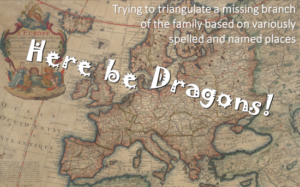
Here be Dragons!
by Mark Loudon
When you don't have information about family members, but you do have some DNA, you can get connections to parts of the family tree, but still not know where you came from. Some records (such as U.S. immigration records and a few others) capture place names — but a lot of places have multiple names — a lot of names refer to multiple places — and spellings are (figuratively and literally) all over the place! Working on parallel fronts can yield information that hopefully tips the balance from "here or here or here" to "very likely here" — a preponderance of evidence, if you like. Just as for sailors of old navigating by the limited charts of the day, nonchalantly marked, "Here be dragons," there are pitfalls and pratfalls when researching old place names and trying to locate them. We'll talk about some techniques that sometimes work, and things to think about on both sides of the equation.
Special Presentation: March 2022
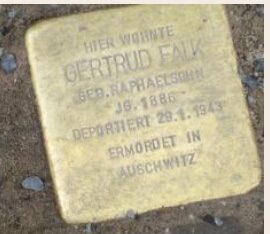
by Megan Lewis, Reference Librarian, USHMM
Megan Lewis will speak about the multiple resources available online in Holocaust Survivors and Victims Database of the USHMM website. Genealogists can learn about a variety of collections made available by the divisions of the Museum’s Library and Archives to assist members with their family history research.
Since 1998, Megan Lewis has served in different roles at the USHMM. Her expertise and familiarity with the Museum’s resources has been much in demand. She has spoken at many genealogy conferences, meetings and programmes. She has earned a BA in History and a Master’s of Library Science from the University of Maryland. In addition, she holds a post graduate certificate in Curation and Management of Digital Assets.
This a joint Zoom presentation with the Jewish Genealogical Society of Washington State. Register in advance for this meeting. After registering, you will receive a confirmation e-mail containing information about joining the meeting.
The image shows a Stolperstein commemorating Stephen Falk's grandmother who was murdered in Auschwitz.
November 2021 Meeting
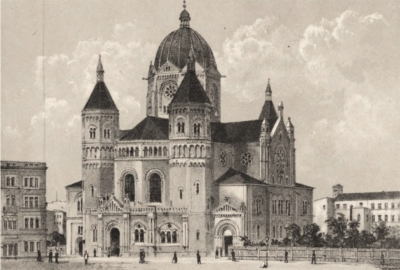
by Norman Streat
I began researching my family history in the early 1980s – after the death of my father (1978) and his brother (1982). I realized that there was no longer anyone of my father’s generation who could tell me about his family history, and I became determined not to let this happen with my mother’s family; a task that has remained my focus for much of the past 40 years. For most of this time, my father’s family history has remained a mystery and I only began to seriously research it in the last 5 years. This was made easier by the many online resources available today as well as genealogy through DNA testing. I will present the results of my research as well as some surprises that DNA provided to me.
The picture shows the New Synagogue in Breslau, Germany which was opened in 1872; one of the largest synagogues in the German Empire, it served the liberal Jewish community. My parents lived in Breslau prior to World War II and they attended this synagogue, which was completely destroyed during the Kristallnacht pogrom 9-10 November 1938. My father was employed by the Breslau Jewish Community until my parents fled Germany in 1939.
October 2021 meeting
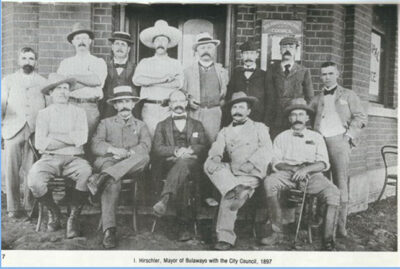
by Ed Goldberg
In the late 19th century the British South African Company made an agreement with local tribes that gave them rights over vast lands north of the Limpopo River. These lands gave rise to a colony known as Rhodesia which had extensive mineral and agricultural wealth. Northern Rhodesia became the state of Zambia in 1964, while Southern Rhodesia became Zimbabwe in 1980. Our own Ed Goldberg, an ex-Rhodesian, will tell us the story of the Jews who made this part of Africa their home.
June 2021 Meeting
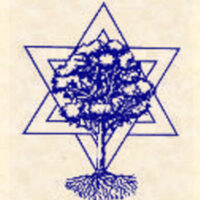
October 2020 meeting
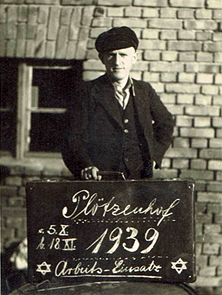
Unraveling my father’s immigration journey
by Elaine Berghausen
Elaine Berghausen’s father arrived in the US in Sept. 1941 from Nazi Germany after being in a concentration camp. That’s all she knew about his experiences in Germany and his immigration to the USA. Using information from sources here and abroad, she has been able to answer many key questions, including when was he arrested and released, where was he after his release until he came to America, and all the approvals/obstacles from both the Nazi and US governments he had to overcome in his remarkable, heroic journey out of Germany to America during World War II.
Elaine retired from a 30+ year with the State of California working for several state agencies, working in finance, grants administration, and program evaluation. After retirement, she worked as a consultant to local water districts. She began researching her family's genealogy in 2016 and lives in Sacramento, California.
This is a members-only webinar
May 2020 meeting
“The Sharper" by Mark Loudon
When researching his Jewish heritage, Mark Loudon repeatedly hit a brick-wall when it came to finding out solid information about his great-grandfather Samuel Bernstein from the East End of London. DNA matches suggested an identification, but misstatements as to his age, two marriage certificates, and other conflicting information caused great confusion until a careful review of street addresses provided the necessary information – namely that Sam had an extensive criminal record and a fair amount of press from all over England. Perhaps it’s fitting that all this detective work actually led to a criminal.
There had indeed been family memories of Sam having been “one of the Sharpers” whatever that meant, and this session will be a review of how Sam was “found” and the insight into his activities and personality revealed by the newspapers and criminal records.
This meeting is open only to members and invited guests.
March 2020 meeting
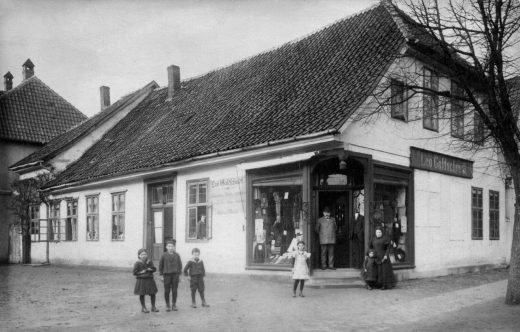
by Norman Streat
This presentation will describe some of the results of Norman Streat’s 35 years of researching his family history. His parents were German Jews who fled the Nazis in 1939. In this talk he will focus on his maternal ancestors whose roots can be traced back approximately 300 years in the small towns and villages of Northern Germany, in the region between the cities of Hanover and Bremen.
The photograph is from the year 1911. It shows Norman’s grandfather Leo Goldschmidt outside his store in the small town of Stolzenau, together with Norman’s grandmother and their five children.
January 2020 meeting
December 2019 meeting
Annual General Meeting: After presentation of the annual reports four directors will be elected for the two year period 2020-2021. This will be followed by a talk:
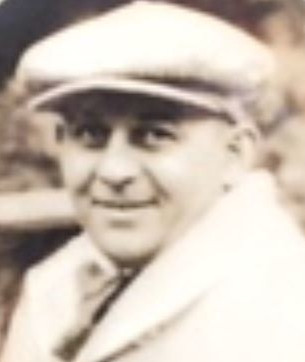
by Cheryl Rimer
“We have family in Cleveland”, said an elderly great-aunt to Cheryl. But no names or other clues to their identity were given. Who are they?
Cheryl will discuss research techniques employed to solve the mystery and to develop a branch of her family tree that began with very little information. A recent trip to Cleveland provided further opportunities for research and discovery. Her research trip included attending the 39th International Association of Jewish Genealogical Societies (IAJGS) conference held in Cleveland, Ohio, July 28-August 2, 2019.
November 2019 meeting
 New and updated websites
New and updated websitesJGSBC
October 2019 meeting
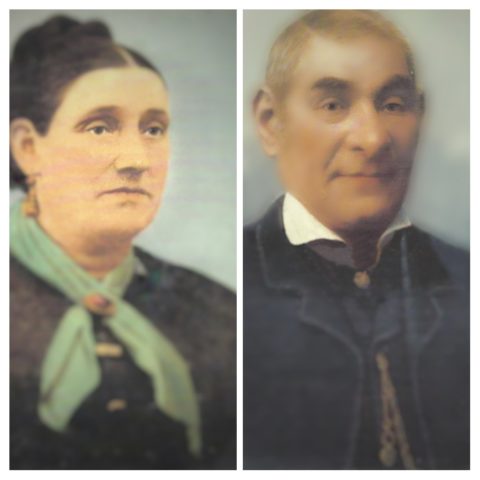
How I met my fathers
by Mark Loudon
Apart from an ambiguous hint dropped by his mum just after his dad died in 1990, and subsequently denied, Mark, a Brit of Scottish, English and Irish ancestry (so far as he knew), had no idea that the man he grew up with was not his biological father.
A chance DNA test in May 2017 revealed a completely different DNA profile than what he was expecting - instead of Scottish paternal heritage, it showed an Eastern European Jewish and Spanish one.
With only a third cousin DNA match to a stranger in Chicago, and some childhood memories from his aunt who was only eight when he was born, Mark set out on a search for closer relatives. This involved not just family history records, but diving into planning records and old photographs for clues. One such photo, shown here, is of the publican of the Sir Walter Raleigh, Aldgate, Henry Naftali-Hirts Hart and his wife Elizabeth Mendoza.
Mark will discuss his journey to discover his biological father, the emotional impact it had, and the subsequent wild ride. This talk will touch upon research into both Ashkenazi and Sephardic family history by way of the East End of London, Amsterdam, and beyond, along with the pitfalls and pratfalls of half-learned DNA research along the way. It will also touch on the issue of nature versus nurture, and the general weirdness of the universe.
September 2019 meeting
by JGSBC members
June 2019 meeting
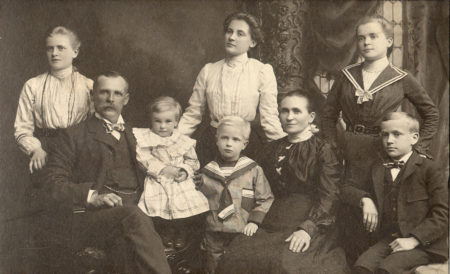
Immigration Stories from my Family Trees
by Catherine Youngren
Past President, JGSBC
Catherine explores the events surrounding the journeys of her Polish, Jewish, Scottish, Presbyterian, English Methodist, and Swiss Free Church ancestors made, finding new homes in England, Scotland and Canada. As Catherine continues to research her roots, she is fascinated by both the unique aspects of each journey, but perhaps, more importantly, by the parallel experiences of each family.
What were the “wheres, the whens, and the whys” behind the decisions to leave their place of birth?
May 2019 meeting
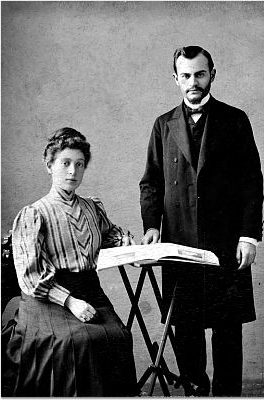
How Wolf Kramerov changed the family Russ-Pomeranz
by David Scriven
In 1907, a young Russian came to the Galician oil town of Boryslaw to open a Hebrew School. This upset the local Chassidim who saw this young man as an evil influence on their sons and, even worse, their daughters. At the end of the first day of the school, a young woman, much older than the usual students, asked Wolf to give her private lessons, and after some discussion he reluctantly agreed. Later he discovered that she was a daughter of the leader of the Chassidim! As the photo of that young woman, my great-aunt Blume, and Wolf shows, they married and as ardent Zionists moved to Palestine, followed by most of my family.
Join me as I tell Wolf's story as he fled Russia to escape the Tsar's army, on to England and deep poverty, then to Galicia where his fortunes changed and he became a teacher and met 'The Lady Pomeranz'. Then to Ottoman Palestine as part of the Second Aliyah. Based on his autobiography, it's a story that could come from a novel as his and my family's lives intersected major events in Jewish life in the 20th century.
David Scriven is a long-time member of the JGSBC and has been doing genealogy since the mid-1990's. He still has a day job as a scientist studying the molecular structure of heart cells at the University of British Columbia.
April 2009 meeting
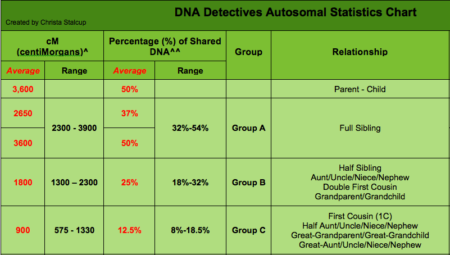
Or why I have 8010 cousins
by David Trost
Endogamy, or marriage within a group, is typical of societies that have geographical, religious or cultural limits. Many of our ancestors lived in societies that had both religious and geographical limitations so that marriage between cousins was common. This makes the analysis of relationships using DNA analysis very complex.
Our own David Trost will guide us in understanding this topic and show how by analyzing the amount shared DNA we can determine who our relatives really are, even in the presence of endogamy.
March 2019 meeting
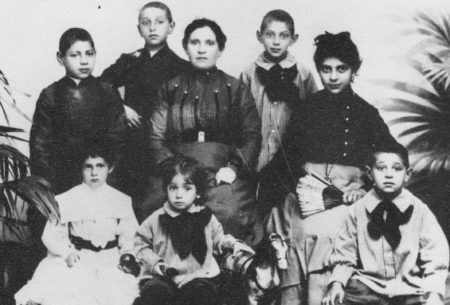
by Michael Levy
In August 1923, my grandmother, Ida Hasenson, left Riga for South Africa. A month later, in Cape Town, she married Morris Thal, a man who was 22 years older than her. Six or seven years later, she divorced him, later to remarry. Morris Thal, my grandfather, died in 1947, four years before I was born. The circumstances of Ida’s marriage to Morris have always been a family mystery. My grandmother did talk to me about her life before leaving Riga, but never said much about my grandfather. Only recently have some the other parts of our conversation begun to make sense to me.
Recently, I have tried to reconstruct, as best I can, the story and circumstances of Ida’s marriage and her life. I have some family photographs and a memoir written by Ida’s sister Manya. This memoir was written after my grandmother had died, and there are only two very brief references to her in the memoir. I recently managed to get some more documents and family stories, in an attempt to uncover my grandmother’s secret. In this talk, I will tell the story of my grandmother’s failed marriage, as far as I have been able to discover it. I will also describe, and show, some of the material about her that I was able to collect.
Michael Levy is on the executive of the Jewish Museum and Archive of British Columbia. He has lived in Canada since 1975. Before moving to Vancouver, he was a professor of Computer Science at the University of Victoria. He also served a term as president of the JCC of Victoria. In 2005, he and his wife moved to Vancouver. He worked as a Software Engineer for Apple until he retired.
February 2019 meeting
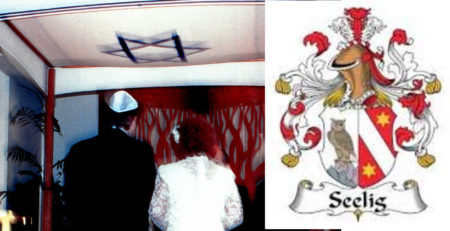
Return to Zion
Roger Seelig
Vancouverite Roger Seelig and his family, partly inspired by the discovery of a Seelig family crest that contains two six-pointed stars, began the research into their genealogy that ultimately changed their lives. Please join us to hear this story of a complex family history; an identity lost and, finally, an identity found.
December 2018 meeting
Annual General Meeting
We will be holding our Annual General Meeting on December 4, where the Chairman and Secretary will give their reports and we will elect directors. This brief meeting will be followed by
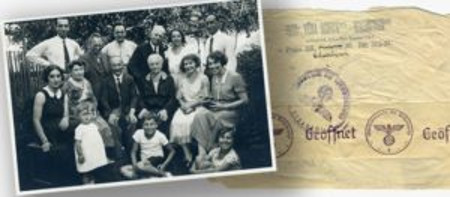
Letters from the Lost
Helen Waldstein Wilkes, Author and researcher
On March 15, 1939, Helen Waldstein Wilkes’s father snatched his stamped exit visa from a distracted clerk to escape from Prague with his wife and child. As the Nazis closed in on a war-torn Czechoslovakia, only letters from their extended family could reach Canada. The Waldstein family received these letters as they made their lives on a southern Ontario farm, where they struggled to make a living in their adopted country and to maintain their silence about their past.
At age 60, Waldstein Wilkes opened a small box that was left by her father in their southern Ontario home. The box held “letters from the lost” – letters from family members left behind in Nazi-occupied Czechoslovakia. The author followed the letters’ trail back to Europe to discover that “the lost” – homeland, past and family – are an inseparable part of her. Her imaginary conversations and the search for answers as she probes beneath the surface of her own life and that of the norms and values that shaped her reality are interwoven with the letters to constitute a book that was nominated for five book awards.
Helen Waldstein Wilkes, PhD, is an energized octogenarian who has lived a richly rewarding life. Helen fled the Nazi’s with her family in 1939 and came to Canada where they struggled to adapt as farmers. Helen was educated in Canada but earned her doctorate (Renaissance French literature) in the U.S. She spent 30 years teaching and developing research interests that include cross-cultural understanding, language acquisition, and neurolinguistics.
November 2018 meeting
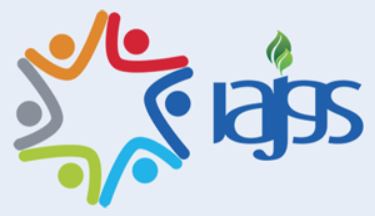
Highlights of the IAJGS 2018 meeting
Gloria Wolfson
Gloria, a local genealogy researcher, attended the 38th IAJGS International Conference on Jewish Genealogy that took place in Warsaw, August 5-10. She will tell us about it and discuss the highlights of her time at the conference.
October 2018 meeting
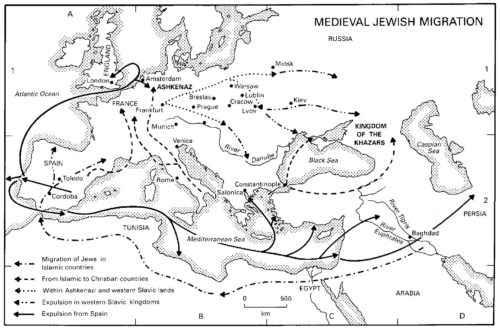
Jewish Migration Patterns
Avraham Groll, Director of JewishGen.org
Part 1 (How Did Jews Get To Europe?): We will first explore the main Jewish migration patterns from Antiquity through the 10th century. We will discuss how Jews reached the land of Israel, where they resettled after multiple expulsions, and under what conditions they lived. As part of this, we will also discuss the dividing line between Antiquity and the medieval era, and its ramifications on future Jewish settlement and living conditions.
Part 2 (Spain and Germany): We will explore patterns of Jewish migration between the 10th-14th centuries, as major Jewish centers emerged in Spain, Germany, France and Italy. We will use Spain and Germany as case studies to understand the conditions within the Jewish community, setting the stage for the eventual shift toward Eastern Europe (the derivative centers). By understanding the Jewish migration patterns, and the circumstances under which they lived, we will be granted a deeper appreciation of our collective Jewish heritage and family history.
Avraham will also discuss recent and future developments at JewishGen.org, where he has been Director since Feb. 2017. Prior to this, he has served JewishGen in a variety of roles since 2008, including Administrator and Senior Director of Business Operations. Avraham holds an MBA from Montclair State University and an MA in Judaic Studies from Touro College, among other degrees.
September 2018 meeting
On our first meeting of the 2018/2019 season we will have an open discussion of genealogical research progress and challenges. Please come and please be prepared to discuss one or more research achievements or problems you have run into.
Please note that our October meeting will be on a different date: Tuesday, October 9. This is to accommodate our speaker Avraham Groll for his presentation “Jewish Migration Patterns”. Avraham is director of JewishGen.
June 2018 meeting
by Emily Garber
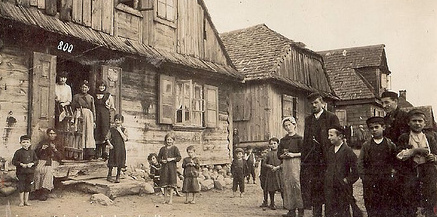
Sometimes tracking one’s immigrant ancestors tests all one’s research acumen. Identifying a subject ancestor, his/her origins, and parentage; tracking that subject through time and space; and constructing a biography to place that person in his/her social context is best approached by broadening one’s research to include family members, associates and neighbors. This presentation will outline a program for solving genealogical research problems via cluster and collateral research techniques. Topics will include: appropriate application, research planning, commonly used resources and documents, and case studies successfully tracking individuals from Europe to the United States, overcoming name and residential changes and using DNA evidence.
Emily Garber (M.A.) is an archaeologist by training and has been researching her Jewish ancestry since 2007. She holds a certificate from Boston University's Genealogical Research program. In 2013 she traveled to Ukraine to visit archives and family villages. Emily is Chair of the Phoenix Jewish Genealogical Society and a board member of the Arizona Jewish Historical Society. She has served for several years as one of the moderators of the JewishGen Discussion Group and is communications director of the Ukraine Special Interest Group.
May 2018 meeting
Prof. Chris Friedrichs
University of British Columbia
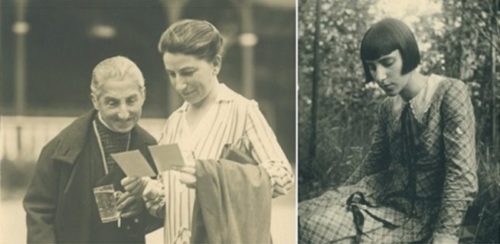
This lecture will describe the lives of three women in Brunswick, Germany – the great-grandmother, grandmother, and mother of the lecturer – whose experiences reflected the changing circumstances of Jews during three generations of German history. Auguste Herxheimer spent most of her adulthood as the prosperous wife and then widow of a successful businessman, but after 1914 she experienced the gradual collapse of a once secure way of life. Her daughter Ella Bruell suffered a series of hardships both as a single mother and as a Jew. Ella’s daughter Nellie faced the future with optimism until everything changed for Jews in Germany after 1933 and she had to create a new life for herself far from her beloved German hometown.
Chris Friedrichs will retire this year after 45 years of teaching history at the University of British Columbia. He is a specialist in the history of urban life in Europe and the history of Jews in Germany. His most recent book is A Jewish Youth in Dresden: The Diary of Louis Lesser, 1833-1837 (University Press of Maryland, 2011).
Note: This meeting is on May 8, the 2nd Tuesday of the month. All welcome.
April 2018 meeting
Janice M. Sellers
Ancestral Discoveries
Janice Sellers, a cousin of member Esther Weinstein, will give a presentation on the effect of copyright law (and abiding by it) on genealogy research -- issues to watch out for, and how to do it right.
Janice Sellers is a professional genealogist (www.ancestraldiscoveries.com), who specializes in Jewish, black and forensic genealogy, and the use of archival newspapers for genealogy research. She edits two genealogy publications: "ZichronNote", the journal of the San Francisco Bay Area Jewish Genealogical Society (SFBAJGS); and "The California Nugget" from the California Genealogical Society. She is the programming and publicity director for SFBAJGS, and a board member of AAGSNC and the California State Genealogical Alliance. She has been on the staff of an LDS Family History Center since 2000; currently at the FHC in Gresham, Oregon.
February 2018 meeting
How One genealogist prepared for trips to Poland, Ukraine and Belarus using the JRI-Poland.org Website.
by Robinn Magid

Come learn about the best ways to use the database at JRI-Poland.org to expand your research for Polish, Galicianer and even Belarussian research from a veteran user of this special collection of information. This presentation will feature stories and examples from 23 years of experience volunteering to help others with the vital records found in the Polish State Archives today. Examples will include Robinn's recent experiences at a Reunion in Poland for the descendants of the Jews of Lublin, and suggestions for preparation for a trip to this year's IAJGS Warsaw Conference.
Robinn Magid is a long-time board member of JRI-Poland and an active member of the San Francisco Bay Area JGS. Robinn serves as the lead co-chair of the forthcoming IAJGS conference.
Robinn recently received a medal from the mayor of Lublin, Poland, her grandmother's hometown, for her work to develop and inspire the cultural identity of the city upon the occasion of its 700th birthday. She has traced her family in Lublin into the early 1700's so far.
January 2018 meeting
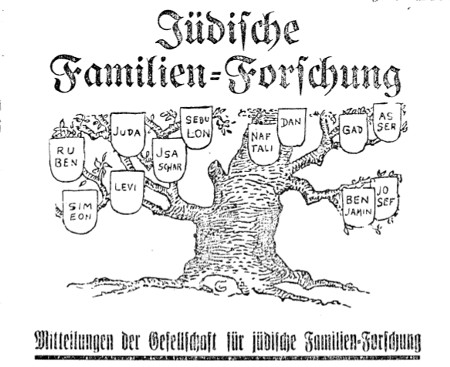
by
Stephen Falk
Stephen will give a presentation about a tracking down a lost branch of his father's CARO family from Chodziesen, a town in Prussia, with diversions to mid 19th century England and Australia, and with a particular focus on the compelling story of a new "half" second cousin twice removed caught up in the Shoah.
Annual General Meeting - December 2017
Notice to All Members:
The JGSBC will hold its annual General Meeting on December 5, 2017 at 7:30 pm at Temple Sholom, 7190 Oak Street, Vancouver, BC. All members in good-standing (dues paid for 2017/2018) will be eligible to vote.
The meeting will be followed by our annual Channukah party.
November 2017 meeting
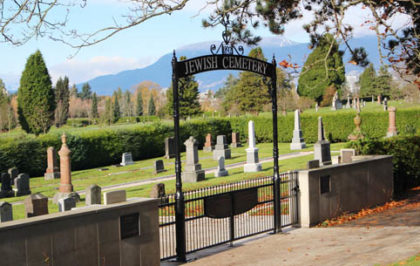
For the November JGSBC meeting, we will be discussing a new cemetery project. Schara Tzedeck Cemetery is undertaking a project similar to the last one, to trace the families of people who bought or reserved grave plots and then moved away or for other reasons never used them -- could just be an outbreak of immortality! If we get information in time, we can dig in (as it were) at the meeting -- bring your laptop, if you have one.
We can also discuss ongoing genealogy puzzles, if time permits.
October 2017 meeting
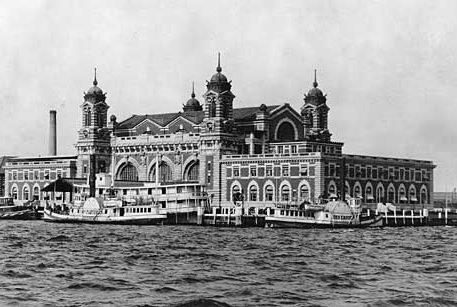
by Joel Weintraub
Joel Weintraub, emeritus Biology Professor at California State University, long-time genealogist and volunteer at the National Archives and Records Administration, will present his latest talk.
Ellis Island, the main immigration station into the U.S., was most active from 1892 through 1924, with about 70% of immigrants to the U.S. passing through there. Prof. Weintraub will discuss the history of the Island including the Wall of Honor, and show the Ship Manifest forms of the US Immigration Service. The pressures of the "Great Migration" eventually led to immigration quotas and he will talk about how this affected the Island. He will debunk the persistent myth of name changes at Ellis Island. Twenty percent of immigrants ended up on detention sheets, and he will reveal where those can be found. Finally, with case studies, he will show us how to use all five of the ship name indexes.
September 2017 meeting
An open discussion of genealogical road blocks as well as recent breakthroughs.
We'll attempt to provide useful suggestions to get past those research obstacles. We'll also hear about some interesting discoveries.
June 2017 meeting
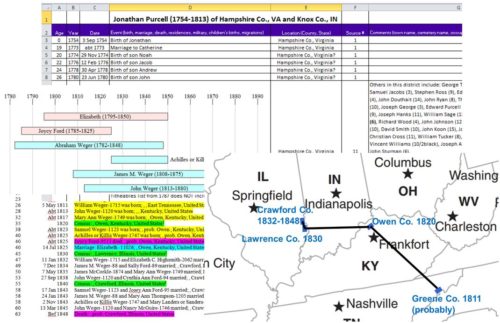
Using Timelines
by Mary Katherine Kozy
Most people are familiar with timelines from taking history in high school. Genealogists, however, can utilize this seemingly commonplace tool to very good effect in their research. Need to know how your ancestor got from one place to another? Trying to sort out several different individuals with the same name? Wanting to understand how your ancestor fit in with major and minor historical events? Come learn how timelines can help answer these and a number of other family history research questions!
Mary Kathryn Kozy has been working on her own family history for over 35 years. She currently serves on the board of the Jewish Genealogical Society of Washington State, maintains two USGenWeb sites, indexes for FamilySearch Indexing, and speaks to many groups in the area. She holds bachelor’s degrees from UW in both Zoology and Information Technology & Systems and has completed the ProGen program with an eye toward certification as a professional genealogist.
May 2017 meeting
 Discovering Secrets, Unraveling a Mystery and a Trip to Canada - Part 2 of Coral Grant's story
Discovering Secrets, Unraveling a Mystery and a Trip to Canada - Part 2 of Coral Grant's story
Coral is visiting us from the Island to continue her story that she began in October last year. Her discoveries began with a family 'bombshell' - A secret her Grandmother thought she had forever concealed, but was eventually revealed but not without a major road block and several twists and turns. The magic of genetic DNA testing ultimately revealed the answer and so much more. A genealogical adventure her Grandmother would never have imagined.
The second part her story focuses on the struggles of her family to come to Canada, how they left Latvia and the tragedy that followed as well as a bit of added history. Don't worry if you missed the first part, there will be a quick recap to get you caught up on the family mysteries and more!
April 2017 meeting
Three members will each present a short talk on genealogical and resources they discovered in 2016.
Earl Lesk will talk about Naturalization papers and Canada Census records. David Scriven will talk about a branch of his mother's family he found in newly-released records and how some unusual annotations confirmed their fate. Stephen Falk will reveal why Rosa, the sister of his great great great grand mother Babette SILBERSTEIN was identified in early 19th century birth records with the maiden name BLÜHDORN.
Mar 2017 meeting
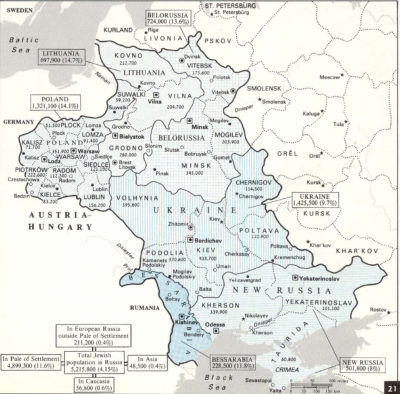
by Hal Bookbinder
Jews in the Russian Empire were mostly restricted to Poland and the Pale, which initially consisted of the vice-regencies of Belorussia, Bessarabia, Lithuania, New Russia, and Ukraine with Poland being incorporated by the 1870s. Hal's presentation will cover the history of the Pale from its creation in 1791 to its dissolution in 1917 and how the many phases of its existence such as confinement, repression, enlightenment and the progroms affected the lives of the Jewish population.
Hal Bookbinder is a former president of IAJGS and currently serves on the Board of JewishGen. His areas of interest include Jewish history, finding missing relatives, European border changes, immigration, citizenship and safe computing.
Open to the Public
Jan 2017 meeting
In our first meeting of the New Year we'll share some of the discoveries and brickwalls of the year past. Bring your computers.
Dec 2016 meeting
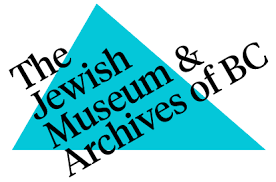
Michael Schwartz, our speaker this month, is Coordinator of Programs and Development at the Jewish Museum and Archives of BC. The JAMBC actively pursues innovative ways of making Jewish community history come alive. Through online exhibits, walking tours, and frequent special events, the organization has undergone a period of reinvention over the past three years. In this talk, Michael will share reflections on this period of transformation and previews of further innovations the JMABC plans to introduce in the coming years.
Special Event
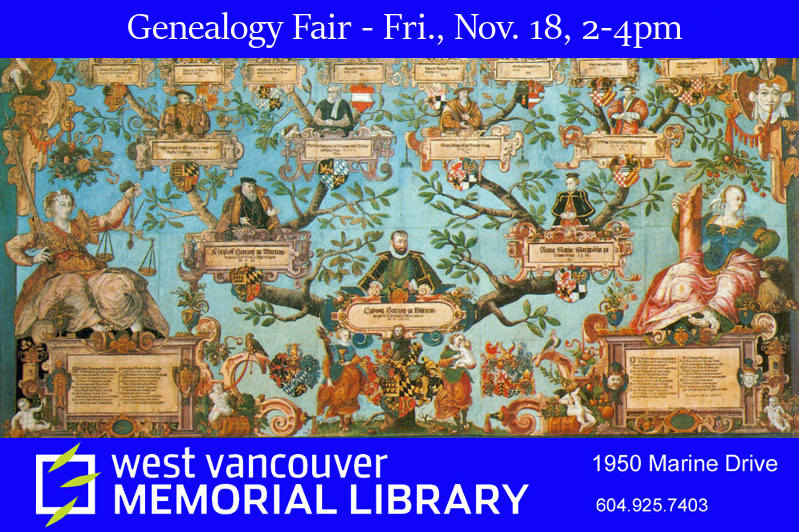
JGSBC, the BC Genealogical Society, Klahanie Research and the West Vancouver Memorial Library will be running a Genealogy Fair on Nov 18 in the Main Hall of the library. Experts from these groups will be there to help you with your research and teach you about the wide range of online and print resources available. This is your chance to dig into topics such as English, Scottish, Irish, First Nations, Eastern European and Jewish genealogy as well as BC archival research and DNA genealogy.
October 2016 Meeting
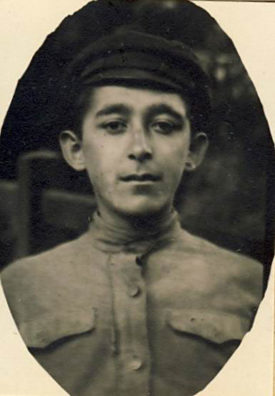 Discovering Secrets and Unraveling a Mystery - a story in 2 parts by Coral Grant
Discovering Secrets and Unraveling a Mystery - a story in 2 parts by Coral Grant
Coral is visiting us from the Island to tell about her research into her family's history. She writes: "Initially, all I had was a piece of paper with a few names and huge gaps in what was a pathetic looking family tree. My first step in filling in the blanks was to send off information requests, to various family members. When my Dad received his request, he was prompted to tell me what he thought was a family 'bombshell' - A secret my Grandmother thought she had forever concealed, but was eventually revealed but not without a major road block and several twists and turns. The magic of genetic DNA testing ultimately revealed the answer and so much more. A genealogical adventure my Grandmother would never have imagined."
Part 1 of this story focuses on Canada, while part 2 (coming in Spring 2017) focuses on Latvia and the Ukraine and Crimea.
September 2016 meeting
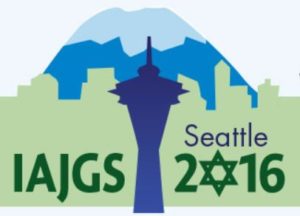
The 36th meeting of the International Association of Jewish Genealogical Societies has just taken place in Seattle. Those who attended will share what we heard and what we learnt.
.June 2016 meeting
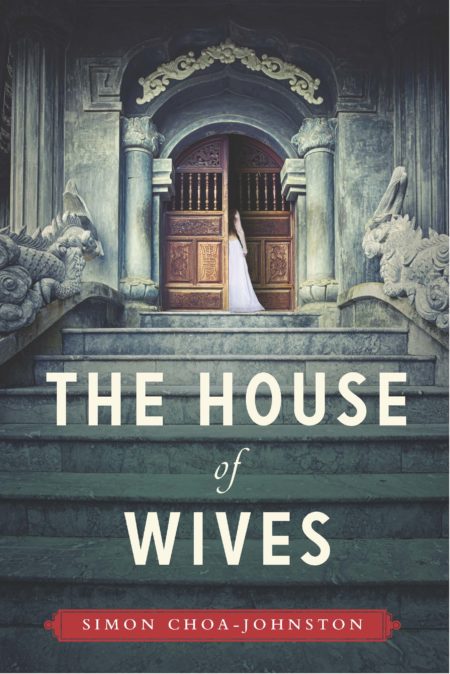
Simon has just published his historical novel The House of Wives, inspired by the lives of his Jewish ancestors. His book follows the life of a young Indian Jew who leaves his wife behind in Calcutta as he goes to Hong Kong to make his fortune in the early opium trade. He remains there, falls in love and starts a relationship with a young Chinese beauty, the daughter of his business partner. Then his wife arrives from Calcutta. This is the story of two remarkable women determined to secure a dynasty for their children in the tumultuous world of 19th century Hong Kong.
Simon is a playwright, director and now novelist and lives in the Vancouver area; for more information about Simon see his website or his FaceBook author's page.
May 2016 meeting
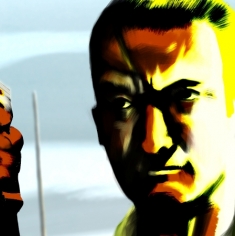 Tzipi Mann will give a talk and present the film Codename: Rafiach.
Tzipi Mann will give a talk and present the film Codename: Rafiach. The Rafiach, an 'illegal' ship transporting 785 Holocaust survivors from Yugoslavia to Palestine, foundered during a storm off the rocky coast of the Greek island of Syrina. While many survived under heroic circumstances, an unknown number were lost. The film, part animation, is the story of the voyage, the members of the Jewish Underground who risked their lives to smuggle people into Palestine and how some of the survivors made their way in the world.
Tzipi Mann is the daughter of two of the survivors and was a driving force behind the making of this film.
April 2016 meeting
 Earl Lesk will discuss the immigration of both sets of his grandparents from Russia to Canada at the turn of the Twentieth Century. The talk will focus on the genealogical resources used to glean the information about Earl’s family history. Earl will cover the time period from their lives in the Pale of Settlement (within the Russian Empire), their immigration to Western Canada, and their new home on the Jewish Agriculture Colonies in Saskatchewan and in Winnipeg. Each set of grandparents experienced a very different Canada as the three Lesk brothers and their families settled in Winnipeg in 1904 and set up their first businesses while the Goorevitch family became farmers.
Earl Lesk will discuss the immigration of both sets of his grandparents from Russia to Canada at the turn of the Twentieth Century. The talk will focus on the genealogical resources used to glean the information about Earl’s family history. Earl will cover the time period from their lives in the Pale of Settlement (within the Russian Empire), their immigration to Western Canada, and their new home on the Jewish Agriculture Colonies in Saskatchewan and in Winnipeg. Each set of grandparents experienced a very different Canada as the three Lesk brothers and their families settled in Winnipeg in 1904 and set up their first businesses while the Goorevitch family became farmers. March 2016 meeting
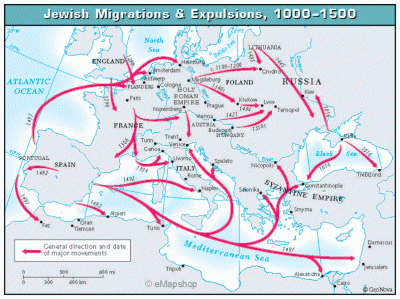 The 'Wandering: How history drove Jewish migration patterns by Pat Johnson
The 'Wandering: How history drove Jewish migration patterns by Pat JohnsonPat Johnson has served on the editorial board of the Jewish Independent for over 20 years and has written numerous articles on Jewish topics. In this presentation, Pat will provide an overview of the migrations that have most affected Jewish life through the last several centuries and try to comprehend some of their historical causes.
